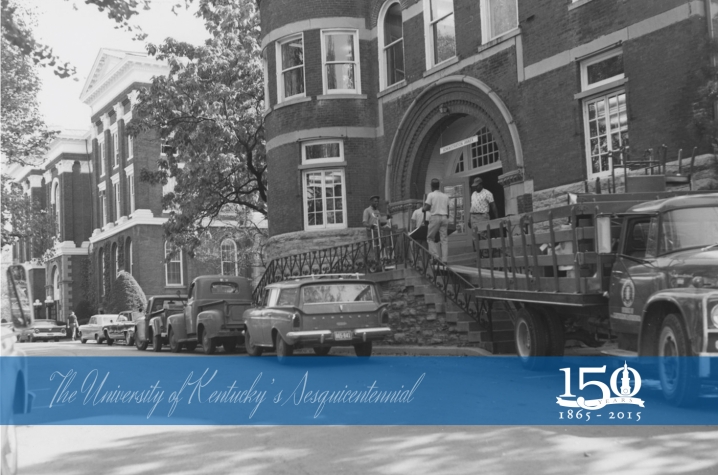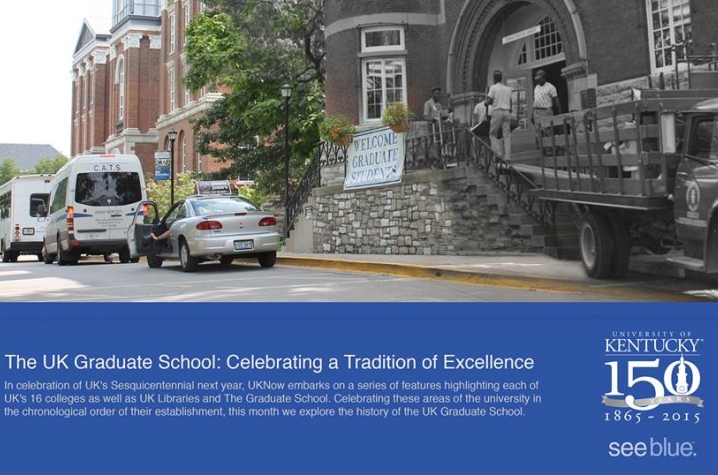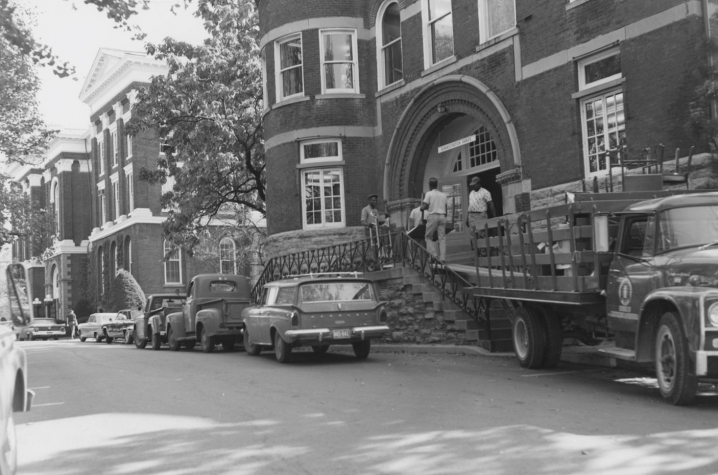The UK Graduate School: Celebrating a Tradition of Excellence
LEXINGTON, Ky. (Dec. 15, 2014) — The University of Kentucky Graduate School's tradition of excellence dates back nearly as far as the institution itself. UK began developing research programs, chiefly in agriculture, as early as the 1870s, when the institution was known by its original name, the Agricultural and Mechanical College of the Kentucky University. The first master’s degree was awarded in 1876.
Thirty-six years and an institutional name-change later, the Graduate School was established in 1912 for what was then known as State University. English professor Alexander St. Clair Mackenzie served as the college's first dean. This initial graduate school "experiment" lasted only four years, as the graduate enrollment was too low and the academic departments were not yet strong enough to support a graduate program. When Mackenzie left the university in 1916, the Graduate School was dissolved and supervision of graduate studies was returned to a faculty committee.
Graduate studies gained momentum in the 1920s nationally and at UK. President Frank L. McVey recruited faculty with strong research reputations and reestablished the Graduate School in 1924, placing it under the direction of zoologist William D. Funkhouser. While graduate degrees accounted for 5 percent of total degrees earned at UK in 1920, by 1930 they accounted for 16 percent. The university conferred its first doctoral degree in 1929.
Funkhouser served as dean of the Graduate School for 24 years until his death in 1948. His tenure saw the establishment of the Kentucky Research Foundation in 1946, later known as the University of Kentucky Research Foundation. As the federal government began increasing its funding for university research, individuals and businesses, such as the Kentucky Distillers Association, also ushered in a new era of support. In 1947, the Keeneland Foundation donated an electron microscope, which was among the most advanced research instruments of the time. This microscope helped to mark the commencement of a new era, when sophisticated tools became central to university research.
The number of awarded graduate degrees accelerated throughout the 1950s, aligning with the university's dramatic transformation as a research institution, and leading to the completion of a medical center in 1962. This facility marked the dawn of a new era of medical research at the University of Kentucky, an era leading to the Markey Cancer Center's 2013 National Cancer Institute designation. This period also saw substantial gains in the humanities, physical and social sciences, and engineering research.
Today, with its guidance to over 90 separate master’s and doctoral programs, the Graduate School leads UK’s conversations about the critical role that graduate education plays at the university, in the Commonwealth, and beyond.
The Graduate School showcases the high quality of UK’s graduate students, strengthens the institution’s cutting-edge research enterprise, assists in the education of the growing undergraduate student body, and attracts top faculty to UK’s campus. It produces top civic leaders, scientists, healthcare professionals, educators, writers and artists. UK’s graduate programs have helped native Kentuckians launch reputations of international prominence, such as author Wendell Berry (M.A., English, 1957). Among the long list of prominent alumni of UK’s graduate programs are astronaut Story Musgrave (M.S., physiology and biophysics, 1966), CIA associate director Lt. General John H. Campbell (MBA, 1971), bacteriologist George H. Scherr (Ph.D., microbiology, 1951), and the current U.S. Ambassador to Oman, Greta Holtz (M.A., international relations, 1984).
Celebrating UK’s sesquicentennial, the Graduate School looks forward to helping UK’s faculty shape the future of graduate education at Kentucky’s flagship university.
Graduate School Deans:
- Alexander St. Clair MacKenzie (English), 1912-1916
- William D. Funkhouser (Zoology), 1924-1948
- Louis A. Purdue (Physics), 1948-1950
- Herman Spivey (English), 1950-1960
- A. D. Kirwan (later served as UK president), 1960-1967
- Dr. Lewis Cochran (Physics, later served as vice president for academic affairs and provost), 1969-1970
- William Dennen (Geology), 1970-1972
- Wimberly Royster (Mathematics), 1972-1988
- Daniel R. Reedy (Spanish), 1989-1996
- Constance Wood, Interim (Statistics), 1996-1997
- Michael T. Nietzel (Psychology), 1997-2001
- Douglas Kalika, Interim (Materials Science and Engineering), 2001-2003
- Jeannine Blackwell (German), 2003-2014
- Susan Carvalho, Interim (Hispanic Studies), 2014- present
MEDIA CONTACT: Sarah Geegan, (859) 257-5365; sarah.geegan@uky.edu







